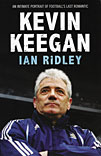 An Intimate Portrait of Football’s Last Romantic
An Intimate Portrait of Football’s Last Romantic
by Ian Ridley
Simon & Schuster, £16.99
Reviewed by Harry Pearson
From WSC 270 August 2009
It’s a popular notion that silence is enigmatic. “Still waters run deep,” we say. Some people, however, can talk a hell of a lot yet remain unfathomable. Kevin Keegan is a veritable babbling brook, yet despite the fact he rarely seems to have shut up for four decades the motivations behind key decisions at important times in his life appear oddly mysterious.
When seeking motives it was once popular to stick to the French dictum cherchez la femme. These days most people prefer its US counterpart, follow the money.
For this sprightly canter through Keegan’s career Ian Ridley pursues the latter course. After a shaky start in which his description of modern Newcastle sounds worryingly like a pull-out newspaper supplement issued by One North East, the author hits his stride. There’s not much that is fresh here, but it’s an entertaining enough overview and ultimately far more illuminating – given the wealth of material already lavished on the subject – than I’d expected. The Keegan who emerges is altogether less opaque than I’d previously thought.
Keegan’s career as player and manager is strange to say the least. Since picking up a second Bundesliga title in 1979 he has not won a major trophy. For someone as apparently driven by the will to win as the man the Germans knew as Mighty Mouse that’s an awfully long period of failure. The question that emerges while reading Ridley’s book is whether it actually was winning that motivated the miner’s son at all. Because while the subtitle trades on the idea of Keegan as a “football romantic”, there is a good deal less about heroism and self-sacrifice than there is about hard cash. Keegan might have left Hamburg for Barcelona or Real Madrid, but stayed on largely because the German club would allow him to go and play in the US during the summer and earn an extra £250,000.
At times it seems that the only thing cavalier about King Kev was his curly hair. When it came to money he took a, well, more parliamentarian view. While Keegan was managing Fulham, for instance, the academy director Alan Smith asked him if he would do the official opening of the new youth wing of the gym. Keegan said he would, but only if the club paid him a fee of £7,000. “As a professional I could see where he was coming from,” Smith says generously before expressing disappointment at his former boss’s attitude.
Keegan, as numerous witnesses attest, is a man determined to the point of obsession with getting his fair share. The quest for what he believed to be fiscal justice bent his judgement out of shape and ultimately led to the sort of walk-outs that have coloured most opinions of him.
At the end of the book Ridley sums up Keegan’s current situation with Norma Desmond’s famous line in Sunset Boulevard: “I am big. It’s the pictures that got small.” I’m not sure that’s quite right though. Football made Keegan a huge figure, but a ceaseless pursuit of money tends to diminish people and by the end of this lively book Keegan has shrunk considerably.